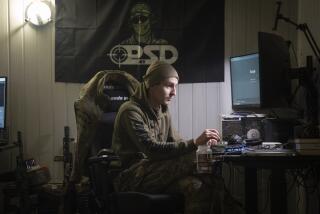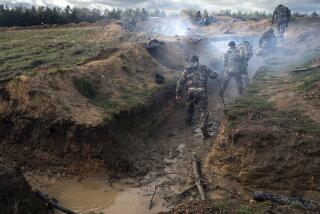At the Front, an Army Clears Its Throat With a Heavy Barrage at Foe : Warfare: Troops steel themselves for the expected assault. Firing by coalition artillery and rockets is the most intense so far.
- Share via
EASTERN SAUDI ARABIA — Talk of peace? Well, that’s for others, really. For U.S. troops--practiced, psyched and strung tight as tripwire--peace is, like, 12 hours of sleep, the pleasant whoosh of a lawn sprinkler, a slab of rare roast beef swimming in juice. It’s something you don’t want to think too much about because it will set you to daydreaming.
And daydreamers get dead.
During this long weekend, America’s vast front-line Army steeled itself to give barely a glance at what may be the last try at peace before the expected ground assault begins. Instead, the soldiers and Marines talked only of the looming ground war.
From all across the outposts and artillery positions and tank emplacements, the dispatches are the same. No daydreamers here.
Overnight at the 1st Infantry Division, artillery batteries fired more than 1,000 rockets and eight-inch shells at Iraqi positions. This was the rumble of an army clearing its throat.
“Yee-hah!” shouted Specialist David Langston, of Garland, Tex.
A 12-foot-long rocket exploded from its pod on one of the Army’s high-tech multiple rocket-launch units, shaking the launch platform and filling the air with the burnt smell of cordite.
“Saddam, you don’t know what you got yourself into, buddy,” Langston said of Iraqi President Saddam Hussein.
It was the heaviest coalition artillery barrage yet, heightening the feeling on this side of the line--and presumably the other--that the moment of battle was at hand.
Somewhere else along the line, at a forlorn staging area called Spearhead Range, Lt. Col Dan Merritt beheld a mobile armored battalion in what may be its final field trials.
To the colonel’s right, Bradley Fighting Vehicles spat machine-gun fire. To his left, the explosions from ground rockets. Close by, thunderous blasts erupted from the M-1A1 Abrams main battle tanks.
“The Air Force has been using kind of a scalpel on the Iraqis--cutting here, cutting there, hoping they’ll bleed to death,” Merritt said.
“What you see here are 10-pound sledges,” he continued, with a sweeping glance at the battalion. “We’ll beat their damned brains in.”
Other preparations added to the sense of impending battle.
Civil affairs specialists rushed to evacuate nomadic Bedouin tribesmen from the line of fire. Bedouins normally do not worry about national boundaries or the bickering of national governments; they move freely about the Arabian desert.
At the 3rd Armored Division, camp was broken for what may be the final repositioning on the front line. Uniforms were washed by hand, showers were taken. Food and water were stocked. Friends wished each other luck.
Like soldiers in every war, they promised to meet again back home in Indiana, or Tennessee or wherever.
The preparations were interrupted for a while as soldiers gathered around a radio to listen to the flurry of news about peace efforts. Specialist Todd Collyer, 27, of Riverside, spoke words that echoed up and down the front lines: Hussein needed to be crushed or Americans would find themselves fighting him again.
“This guy is just going to build up again,” Collyer said. “I think we need to finish the job we started.”
As preparations for the land battle intensify, so does concern about one of the cruelest killers of the war so far--”friendly fire.”
Coalition forces have been listening, along with the rest of the world, to one unsettling report after another about American aircraft firing or bombing friendly positions.
At one forward U.S. Army battalion, soldiers from other coalition countries have brought over some of their vehicles to familiarize the Americans firsthand.
U.S. techno-weaponry continues to arrive, even at this late date. At one battalion, troops were receiving night-vision laser sights for their M-16 rifles and a new Mark 19 automatic grenade launcher.
Even the most sober reflections had little relationship to the wispy talk of peace in far-off capitals. At the Army’s 54th Forward Support Battalion, Lt. Col. Rosalyn Goff spoke of the front-line soldiers.
“These people are 18 and 19 and 20 years old. The last thing they remember doing is listening to Pink Floyd and drinking a beer. What they are going to see up front, nobody should have to see.”
This story was written from pool reports cleared by military censors.
More to Read
Sign up for Essential California
The most important California stories and recommendations in your inbox every morning.
You may occasionally receive promotional content from the Los Angeles Times.










